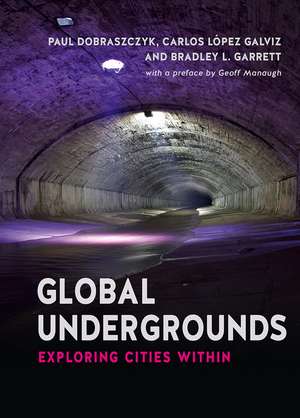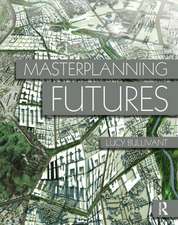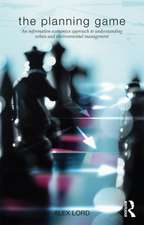Global Undergrounds: Exploring Cities Within
Editat de Carlos López Galviz, Paul Dobraszczyk, Bradley L. Garrett Cuvânt înainte de Geoff Manaughen Limba Engleză Paperback – 15 iul 2016
Rest your eyes long enough on the skylines of Delhi, Guangzhou, Jakarta—even Chicago or London—and you will see the same remarkable transformation, building after building going up with the breakneck speed of twenty-first-century urbanization. But there is something else just as transformative that you won’t see: sprawling networks of tunnels rooting these cities into the earth. Global Undergrounds offers a richly illustrated exploration of these subterranean spaces, charting their global reach and the profound—but often unseen—effects they have on human life.
The authors shine their headlamps into an astonishing diversity of manmade underground environments, including subway systems, sewers, communications pipelines, storage facilities, and even shelters. There they find not only an extraordinary range of architectural approaches to underground construction but also a host of different cultural meanings. Underground places can evoke fear or hope; they can serve as sites of memory, places of work, or the hidden headquarters of resistance movements. They are places that can tell a city’s oldest stories or foresee its most distant futures. They are places—ultimately—of both incredible depth and breadth, crucial to all of us topside who work as urban planners, geographers, architects, engineers, or any of us who take subway trains or enjoy fresh water from a faucet. Indeed, as the authors demonstrate, the constant flux within urban undergrounds—the nonstop circulation of people, substances, and energy—serves all city dwellers in myriad ways, not just with the logistics of day-to-day life but as a crucial part of a city’s mythology.
The authors shine their headlamps into an astonishing diversity of manmade underground environments, including subway systems, sewers, communications pipelines, storage facilities, and even shelters. There they find not only an extraordinary range of architectural approaches to underground construction but also a host of different cultural meanings. Underground places can evoke fear or hope; they can serve as sites of memory, places of work, or the hidden headquarters of resistance movements. They are places that can tell a city’s oldest stories or foresee its most distant futures. They are places—ultimately—of both incredible depth and breadth, crucial to all of us topside who work as urban planners, geographers, architects, engineers, or any of us who take subway trains or enjoy fresh water from a faucet. Indeed, as the authors demonstrate, the constant flux within urban undergrounds—the nonstop circulation of people, substances, and energy—serves all city dwellers in myriad ways, not just with the logistics of day-to-day life but as a crucial part of a city’s mythology.
Preț: 144.22 lei
Preț vechi: 163.98 lei
-12% Nou
Puncte Express: 216
Preț estimativ în valută:
27.60€ • 28.71$ • 22.79£
27.60€ • 28.71$ • 22.79£
Carte disponibilă
Livrare economică 24-31 martie
Livrare express 08-14 martie pentru 60.87 lei
Preluare comenzi: 021 569.72.76
Specificații
ISBN-13: 9781780235769
ISBN-10: 1780235763
Pagini: 320
Ilustrații: 60 color plates, 20 halftones
Dimensiuni: 165 x 229 x 20 mm
Greutate: 0.76 kg
Editura: REAKTION BOOKS
Colecția Reaktion Books
ISBN-10: 1780235763
Pagini: 320
Ilustrații: 60 color plates, 20 halftones
Dimensiuni: 165 x 229 x 20 mm
Greutate: 0.76 kg
Editura: REAKTION BOOKS
Colecția Reaktion Books
Notă biografică
Paul Dobraszczyk is a visiting lecturer at the Bartlett School of Architecture and the author of Into the Belly of the Beast and Iron, Ornament and Architecture in Victorian Britain. Carlos López Galviz is a lecturer in the theories and methods of social futures at Lancaster University and coeditor of Going Underground. Bradley L. Garrett is a social geographer at the University of Southampton and the author of Explore Everything and Subterranean London.
Cuprins
Preface
Global Undergrounds
Geoff Manaugh
Introduction
Exploring Cities Within
Paul Dobraszcyk, Carlos Lopez Galviz and Bradley L. Garrett
Origins
Taming the Quagmire: Cloaca Maxima, Rome
Journey of an Underground Army: Xi’an
Protective Labyrinths: Sint Petersburg Tunnels, Maastricht
A Skiff, Fish and Wells: Basilica Cistern, Istanbul
Old, Deep, and Discreet: Cappadocia’s Underground Cities
Under Kingdom: the Layers of Mexico City
Labour
Absurd Space: Williamson Tunnels, Liverpool
Hidden Labour: Broad Street Subway, Philadelphia
Salt of a Mining Cathedral: Zipaquirá, Colombia
Human Life Underground: Vale un Potosí, Bolivia
Infrastructural Fetishism: York Metro Extension, Toronto
Wares, Rights and Stars: Delhi’s Metro and Bazar
Dwelling
Underground Outback: Coober Pedy, Australia
Beneath the Neon: Flood Channels, Las Vegas
Death Squads and Firebombs: Sewers of Bogotá
Mateship Below: Melbourne Drains
Class Dividers: Lower Wacker Drive, Chicago
Diggers and Deserters: Odessa Catacombs
Refuse
Into the Vortex: Brighton Sewers
Waste and Work: New York City Sewers
Lost Undergrounds: Atlantic Avenue Tunnel, New York
Repressed Wastes: London’s Sewers
Burying Incomprehensible Horror: Yucca Mountain Nuclear Storage
Memory
Sinking Histories: Berlin’s S- and U-Bahn tunnels
Bunker Art: Christian and Karen Boros Collection, Berlin
Bedrock Memories: Nottingham’s Caves
Remembering the Map: Prestwich Memorial, Cape Town
Underground Clouds: Hong Kong Data Centres
Mirror of History: Berlin’s Water Tower
Ghosts
Haunted Spaces: Edinburgh’s Medieval Vaults
Visiting the Dead: London’s Victorian Catacombs
Temporal Disjunctions: Abandoned London Underground
Adopting the Dead: Fontanelle Cementery, Naples
Communist Ghosts: Plovdiv Seismological Lab
Orpheus in the Air-raid Shelter: Underground Theatre, Prague
Fear
Striving Underground: Stockholm’s Atomic Bomb Defences
Sheltered Lives: Shanghai Civil Defence Shelters
Remote Shelter: Andersgrotta, Norway
Defence of the Nation: National Redoubt, Switzerland
Undergrounds at War: London’s Second World War Bunkers
Tortoises, Oranges and Giant Tunnels: Bunkers, Albania
Surface Terror: Tokyo Chikatetsu
Security
Dark Tourism and Data Dumps: Reusing Missile Silos in the American West
Subterranean Insurgency: Joint Tunnel Test Range, Arizona
Sent Down: Oxford’s Prison Tunnels
Under Control: Metro, Santiago de Chile
Crossing Borders: Tijuana and San Diego
Vertical War Zones: Gaza Tunnels
Resistance
Insurgent Strongholds: The ‘Hidden City’ of Viengxay
Defensible Spaces: The Underground Cities of Kinmen and Matsu
Ideology and Fear: Prague Metro
Intractable Histories: Moscow’s Secret River
Reverse Modernization: Saw Mill River, New York City
Remaindered Flows: The Irk Culvert, Manchester
Renderings
Subterranean Sublimes: Roden Crater, Arizona
Remaindered Spaces: Manchester’s Air-raid Shelters
Under Construction: Buenos Aires Subte
Cinematic Space: Vienna’s Sewers and The Third Man
Remaking the Map: Golden Acre, Cape Town
Encountering Undergrounds: Levitated Mass, Los Angeles
Cameras and Cleaning Balls: Paris Sewers
Exposure:
As Above, So Below: Paris Catacombs
Cracks in the System: Antwerp Pre-metro
Urban Layers: Athens
Secret City: Burlington, Wiltshire
Under the Ice: Polar Undergrounds
The City and the City: Underground Seattle
Edges
Urban Rhythms: St Petersburg Metro
Unruly Spaces: Cairo Metro
Edge of Existence: Abandoned Bratislava Metro
Mystic Caverns: Grand Central Terminal, New York
Buried Waterways: Brescia Underground
Off the Map: Cape Town Tunnels
Futures
Futures Past: Pyongyang Metro
Sleeping Dragons: Future Ruins of CERN
Segregating Symbols: Dubai’s Metro
The Great Society: Washington’s Metro
Slow Modernity: Sofia Metro
Time Underground: The Clock of the Long Now
After the End: Svalbard Global Seed Vault
References
Notes on Contributors
Photo Acknowledgements
Global Undergrounds
Geoff Manaugh
Introduction
Exploring Cities Within
Paul Dobraszcyk, Carlos Lopez Galviz and Bradley L. Garrett
Origins
Taming the Quagmire: Cloaca Maxima, Rome
Journey of an Underground Army: Xi’an
Protective Labyrinths: Sint Petersburg Tunnels, Maastricht
A Skiff, Fish and Wells: Basilica Cistern, Istanbul
Old, Deep, and Discreet: Cappadocia’s Underground Cities
Under Kingdom: the Layers of Mexico City
Labour
Absurd Space: Williamson Tunnels, Liverpool
Hidden Labour: Broad Street Subway, Philadelphia
Salt of a Mining Cathedral: Zipaquirá, Colombia
Human Life Underground: Vale un Potosí, Bolivia
Infrastructural Fetishism: York Metro Extension, Toronto
Wares, Rights and Stars: Delhi’s Metro and Bazar
Dwelling
Underground Outback: Coober Pedy, Australia
Beneath the Neon: Flood Channels, Las Vegas
Death Squads and Firebombs: Sewers of Bogotá
Mateship Below: Melbourne Drains
Class Dividers: Lower Wacker Drive, Chicago
Diggers and Deserters: Odessa Catacombs
Refuse
Into the Vortex: Brighton Sewers
Waste and Work: New York City Sewers
Lost Undergrounds: Atlantic Avenue Tunnel, New York
Repressed Wastes: London’s Sewers
Burying Incomprehensible Horror: Yucca Mountain Nuclear Storage
Memory
Sinking Histories: Berlin’s S- and U-Bahn tunnels
Bunker Art: Christian and Karen Boros Collection, Berlin
Bedrock Memories: Nottingham’s Caves
Remembering the Map: Prestwich Memorial, Cape Town
Underground Clouds: Hong Kong Data Centres
Mirror of History: Berlin’s Water Tower
Ghosts
Haunted Spaces: Edinburgh’s Medieval Vaults
Visiting the Dead: London’s Victorian Catacombs
Temporal Disjunctions: Abandoned London Underground
Adopting the Dead: Fontanelle Cementery, Naples
Communist Ghosts: Plovdiv Seismological Lab
Orpheus in the Air-raid Shelter: Underground Theatre, Prague
Fear
Striving Underground: Stockholm’s Atomic Bomb Defences
Sheltered Lives: Shanghai Civil Defence Shelters
Remote Shelter: Andersgrotta, Norway
Defence of the Nation: National Redoubt, Switzerland
Undergrounds at War: London’s Second World War Bunkers
Tortoises, Oranges and Giant Tunnels: Bunkers, Albania
Surface Terror: Tokyo Chikatetsu
Security
Dark Tourism and Data Dumps: Reusing Missile Silos in the American West
Subterranean Insurgency: Joint Tunnel Test Range, Arizona
Sent Down: Oxford’s Prison Tunnels
Under Control: Metro, Santiago de Chile
Crossing Borders: Tijuana and San Diego
Vertical War Zones: Gaza Tunnels
Resistance
Insurgent Strongholds: The ‘Hidden City’ of Viengxay
Defensible Spaces: The Underground Cities of Kinmen and Matsu
Ideology and Fear: Prague Metro
Intractable Histories: Moscow’s Secret River
Reverse Modernization: Saw Mill River, New York City
Remaindered Flows: The Irk Culvert, Manchester
Renderings
Subterranean Sublimes: Roden Crater, Arizona
Remaindered Spaces: Manchester’s Air-raid Shelters
Under Construction: Buenos Aires Subte
Cinematic Space: Vienna’s Sewers and The Third Man
Remaking the Map: Golden Acre, Cape Town
Encountering Undergrounds: Levitated Mass, Los Angeles
Cameras and Cleaning Balls: Paris Sewers
Exposure:
As Above, So Below: Paris Catacombs
Cracks in the System: Antwerp Pre-metro
Urban Layers: Athens
Secret City: Burlington, Wiltshire
Under the Ice: Polar Undergrounds
The City and the City: Underground Seattle
Edges
Urban Rhythms: St Petersburg Metro
Unruly Spaces: Cairo Metro
Edge of Existence: Abandoned Bratislava Metro
Mystic Caverns: Grand Central Terminal, New York
Buried Waterways: Brescia Underground
Off the Map: Cape Town Tunnels
Futures
Futures Past: Pyongyang Metro
Sleeping Dragons: Future Ruins of CERN
Segregating Symbols: Dubai’s Metro
The Great Society: Washington’s Metro
Slow Modernity: Sofia Metro
Time Underground: The Clock of the Long Now
After the End: Svalbard Global Seed Vault
References
Notes on Contributors
Photo Acknowledgements
Recenzii
“Well worth dipping into for its worldwide take on the sheer variety of ways we humans have spun our subterranean webs. . . . These underground stories remind us that buried spaces are places of protection as well as of the fearfully unknown, of hope and of political resistance, of science as well as persistent chthonic mythology. There’s always a quirky and sometimes a grisly journey to be had beneath our streets.”
“Global Undergrounds serves as a catalog that positions eighty underground sites of urban, suburban, and rural development, and most segments offer a connection to the culture of the present and the past. . . . Diverse authors offer approaches as academics, official visitors, tourists, or adventurers, engaging with spaces and places that usually remain hidden from both sight and mind.”
"Treats the subject properly and carefully the editors acknowledge that this is a world not often seen, one hidden to nearly all, yet one which holds a fascination for anyone who wonders what lies beneath their feet. It is done extremely well, specially as the layout is appealing, being enriched with color photographs of sometimes obscure underground places it is a book to dip into that becomes difficult not to dip into the next section of engaging text. . . . Cavers, mine historians, and urban explorers will all enjoy this read. . . . A substantial and attractive book book with diversity as its major strength."
"The volume takes a unique shape, composed of eighty brief essays, each around two pages, from twenty-six contributors. Their geographic reach is truly global, touching every continent. Each contribution analyzes an underground site, memorably and often personally, in a style that varies from autobiographical to journalistic or ethnographic, which strongly suggests travel narrative. The book is richly illustrated with color images, mostly photographs by the contributors. Though not as systematic as an encyclopedia, the collection was similarly assembled from voluntary contributions. More scholarly than an atlas or travel guide but equally attuned to particular spaces, places, and their various social uses and meanings, the book could well inspire travel or urban exploration."










